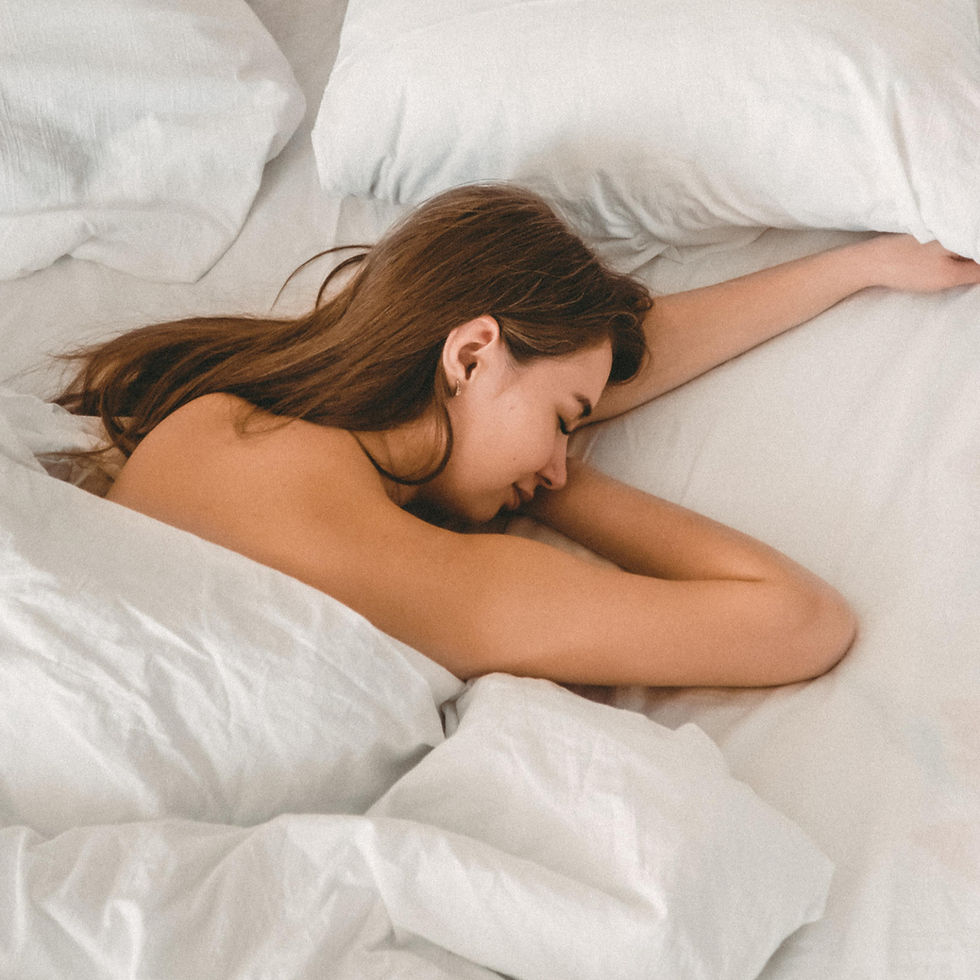No Phone Before Bed - Have You Tried It? Ditching Screen Time for Better Sleep
- R A E

- Aug 12, 2024
- 5 min read
Updated: Nov 17, 2024

Let’s be honest—our phones have become an extension of ourselves, especially when it comes to winding down for the night. I used to be that person who would scroll until my eyelids felt heavy, only to wake up feeling more tired than when I went to bed. For a long time, I didn’t think much of it. After all, everyone does it, right? But as the grogginess started creeping into my mornings, and my productivity took a nosedive, I knew something had to change.
At first, I didn’t realize how much of an impact that late-night screen time was having on my sleep patterns. It felt harmless enough—scroll through Instagram, reply to a few messages, maybe watch a funny video or two. But those innocent habits were wreaking havoc on my sleep cycle.
It’s not just about breaking a habit—it’s about understanding why that habit is harmful in the first place. The science backs it up too. Research shows that screen time before bed can significantly impact sleep quality. The blue light emitted by screens can suppress melatonin production, the hormone that regulates sleep. This disruption can delay sleep onset, reduce the time spent in deep sleep, and lead to fragmented sleep cycles, all of which contribute to that groggy, unrefreshed feeling in the morning.
Additionally, the constant barrage of notifications doesn’t help. Each buzz or ding triggers a mini adrenaline rush, making it harder for your mind to settle down.
So, I decided to take action, gradually implementing small changes to curb my nighttime scrolling habit. Here are five alternatives that worked for me, and they might just work for you too.
01 - Reading a Book or Kindle
One of the first changes I made was swapping my phone for a book or my Kindle before bed. Unlike my phone, my Kindle doesn’t bombard me with notifications or tempt me with social media. I set it to a mode that’s easier on the eyes—warmer lighting and lower brightness. The simple act of reading something I enjoy not only distracted me from my phone but also helped me unwind in a much healthier way.
It wasn’t just about avoiding the phone; it was about creating a ritual that I looked forward to. I found that reading, whether it was a novel or something more educational, allowed me to mentally and emotionally distance myself from the day’s stress. This transition made it easier for my mind to slip into a restful state. And you know what? I noticed a difference almost immediately. I fell asleep faster, and my sleep felt deeper and more rejuvenating.
02 - Keeping My Phone Away from the Bed
Another game-changer was physically removing the temptation. I started placing my phone across the room or in a different room altogether. It sounds simple, but the laziness that kicks in when you’re all cozy in bed really works in your favor here. If I had to get up to grab my phone, it was enough of a deterrent to make me reconsider.
At first, it was a bit of a struggle. I found myself wanting to check my phone out of habit, but over time, it became easier. The distance created a boundary, a clear signal that bedtime was for sleep, not for scrolling. It also helped reduce the mental association between my bed and screen time, making it easier to fall asleep without that itch to check my phone one last time.
03 - Using a Smart Bulb with a Dimmer Routine
I’m not one to give up all my gadgets, so I decided to use technology to my advantage. I got a smart bulb for my bedroom and set a routine where the light would gradually dim over a period of time before eventually turning off. This slow dimming mimicked the natural sunset, helping to cue my body that it was time to wind down.
It was like tricking my circadian rhythm into behaving the way it’s supposed to. The gradual dimming created an ambiance that felt natural and calming. By the time the light was fully off, I was usually half asleep already. This small tweak not only helped me fall asleep faster but also made the transition from wakefulness to sleep feel smoother and less jarring.
04 - Journaling Before Bed
One of the things that kept me glued to my phone was the endless cycle of thoughts running through my mind. Journaling before bed became a therapeutic way to unload those thoughts, making me feel less anxious and more at peace. Writing down my worries, my to-do lists, or just random musings helped clear the mental clutter that often drove me to distraction.
It’s amazing how much lighter you feel after putting pen to paper. The act of writing down my thoughts allowed me to process them in a way that scrolling through my phone never could. Instead of endlessly browsing for distraction, I found myself looking forward to this quiet time of reflection. And when my mind was clearer, it became easier to resist the urge to pick up my phone.
05 - Setting My Phone on Do Not Disturb
Lastly, I embraced the beauty of the “Do Not Disturb” mode on my phone. I customized it to allow only important calls to come through, which meant I didn’t have to worry about missing anything urgent. This simple adjustment meant no more buzzing or lighting up in the middle of the night, which in turn, meant fewer disruptions to my sleep.
It’s surprising how much of a difference this made. Without the constant interruptions, I found myself less tempted to check my phone. Over time, I stopped expecting notifications altogether, which made it easier to focus on relaxing and falling asleep. The impact on my sleep quality was noticeable, and I woke up feeling more refreshed and ready to take on the day.
The Impact on My Sleep and Productivity
The results of these small changes were profound. My sleep cycle gradually reset, and I started waking up feeling more rested. My productivity during the day improved as well. I was no longer battling the fog of sleep deprivation, and I found myself more focused and energized. It wasn’t an overnight fix, but with intentional effort, I noticed a significant improvement in my overall well-being.
Resetting your sleep cycle takes time, but it’s not as difficult as it might seem. These small tricks almost fool your body into setting it right on its own. If you’ve been struggling with sleep and productivity, I highly recommend giving these alternatives a try. It’s all about creating a routine that works for you, one that helps you disconnect from your devices and reconnect with your natural sleep rhythm.
Breaking the habit of scrolling before bed wasn’t easy, but it was worth it. These alternatives helped me reclaim my evenings and, more importantly, my sleep. If you’re like me and have struggled with sleep because of your phone, I encourage you to try out these tips.
It’s not just about ditching the phone; it’s about creating a bedtime routine that nourishes your body and mind, setting you up for a more restful night and a more productive day.
So, have you tried ditching your phone before bed? If not, maybe tonight’s the night to start.
Love,
Rae
Image Credits - Aleksey Danilov



















.jpg)
Comments